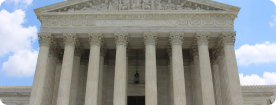

$165
Fourth Amendment: Unreasonable Searches & Seizures
Torres v Madrid. Is shooting someone, but not stopping them, a seizure?
Caniglia v Strom For entry into a home, is there a “community caretaking” exception to the warrant requirement?
Lange v California For entry into a home, is hot pursuit to arrest for a misdemeanor an exception to the warrant requirement?
United States v Cooley Does a tribal police officer have authority to detain temporarily and to search non-Indians traveling on public rights-of-way running through a reservation for potential violations of state or federal law?
Eighth Amendment: Cruel & Unusual Punishment
Taylor v Riojas Was it clearly established that prisoners could not be housed for six days in cells teeming with human waste, so that defendants were not entitled to qualified immunity ?
Jones v Mississippi Is a specific finding of permanent incorrigibility required to sentence a person under 18 to life without the possibility of parole?
42 USC Section 2000cc-1: Protection of Religious Exercise of Institutionalized Persons
Dunn v Smith Is there a right to the presence of a spiritual adviser during an execution?
28 USC Section 2254: Habeas Corpus - Persons in State Custody Remedies in Federal Courts
Alaska v Wright Is a person “in custody pursuant to the judgment of a State court” if he is imprisoned for a Federal crime and the predicate for that crime was a state conviction?
Edwards v Vannoy Does the unanimous jury requirement announced in Ramos v Louisiana apply to convictions that were final on direct appeal before that decision? Or: Should “watershed” rules of constitutional criminal procedure ever apply retroactively on Federal Habeas Corpus?
Shinn v Kayer, Mays v Hines & Dunn v Reeves Did the state court ruling rejecting an incompetent counsel claim, result in a “decision that was contrary to, or involved an unreasonable application of, clearly established Federal law, as determined by the Supreme Court of the United States” ?
8 USC Section 1326(d): Limitation on Collateral Attack on Deportation Order
United States v. Palomar-Santiago Was defendant excused from two of the prerequisites for collateral attack on a removal order, where his conviction was not a proper basis for removal?
Federal Criminal Offenses
Van Buren v United States Does it violate the Computer Fraud and Abuse Act to obtain from a computer for an improper purpose, information lawfully available to defendant ?
Borden v U.S. Can an offense that requires only recklessness count as a “violent felony” in the “use of force” clause of the Armed Career Criminal Act ?
U.S. v Briggs In the Uniform Code of Military Justice statute of limitations, does “offense punishable by death” mean death that is constitutionally permissible or death that is authorized by statute?
Terry v U.S. Under the First Step Act retroactivity provision, is a crack offender eligible for a sentence reduction for a crack offense conviction that did not trigger a mandatory minimum?
FRCP Rule 52: Harmless and Plain Error
Greer v. United States Was it plain error to not instruct Greer’s jury that knowledge of a felony conviction is a required element of possession of a firearm by a felon or to not advise Gary of that requirement before his guilty plea?




